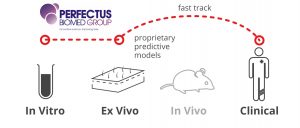An estimated 80% of non-COVID-19 clinical trials were stopped or interrupted due to the global pandemic according to Aaron von Dorn writing in The Lancet in August 20201. What are your options when this happens?
Lockdown has highlighted the vulnerabilities in clinical studies which are dependent on healthcare resources and typically require bringing people together2. The time lines on restarting clinical trials are unknown and in order to progress product development companies are looking for alternatives to clinical trials. Throughout the pandemic scientists at Perfectus Biomed have continued to develop and accredit models that can be utilised as alternatives animal testing, but these models also have a place as alternatives to clinical studies. In addition to customised Ex vivo tissue models we also offer highly reproducible, validated and FDA accepted Ex vivo models that are capable of exhibiting whole system processes such as healing and the release of inflammatory markers, cytokines and other measurable metabolites. In many cases this data can be used in place of clinical trials to demonstrate product efficacy, product safety and to inform product development.
In vitro and ex vivo models as clinical substitutes and animal testing alternatives
Several in vitro cell models are already recognised by the FDA as in vivo and clinical substitutes3,4. In vitro and ex vivo tissue models are rapidly gaining traction for replacing animal testing in the cosmetic industry and the medical devices sector is set to follow suit5-7.
In vitro alternatives offered by Perfectus Biomed range from monolayer cell culture right through to validated, reconstructed 3D tissue models. Additionally we provide Ex vivo models up to and including models that utilise human tissue and blood. Our in-house microbiology and molecular biology services include infected wound models that can be used to examine downstream molecular analysis in a range of applications.

Cell Monolayer Testing
Examples of cell monolayer testing we can provide include scratch wound assays, cell viability, proliferation and migration, combined with imaging and microscopy techniques. We also assess the cytotoxicity of products according to ISO 10993-5.
3D Tissue Models
Some of the 3D models can be used to examine wound healing in a 3D structure, macrophage recruitment, downstream molecular analysis and antibody staining. These models can be artificially contaminated, in order to investigate the treatment effects on an infected wound model, with a range of imaging techniques to visualise the treatment and healing progression. They also find application for in vitro skin sensitisation, following OECD 442 c, d and e. Models including human epidermis, corneal and oral epithelium structures.
Ex vivo Tissue Models
Finally, we can run testing on both ex vivo porcine and human tissue. We have developed several methods to determine product interactions on artificial wounds including epidermal wounds, ex vivo burn models, and a UKAS accredited infected porcine lung model. These can be paired with a range of imaging, including confocal microscopy, scanning electron microscopy (SEM) and histology to visualise the treatment effects.
Along with our variety of cell services, we also offer a wide range of customisable in-vitro biofilm studies, being the first laboratory in the world to gain ISO 17025 accreditation of biofilm models. These models accurately indicating product performance against chronic infection.
Please get in touch today to find out more about how in-vitro models can inform next steps and optimise pre-clinical testing, how ex-vivo models can meaningfully predict clinical conditions or if you seek alternatives to animal testing. Our studies can give you the insight you need to develop and perfect your products, formulations, medical devices and wound dressings without the immediate need for clinical studies.
1. https://www.thelancet.com/journals/lancet/article/PIIS0140-6736(20)31787-6/fulltext
3. https://www.fda.gov/media/138409/download
5. https://pubmed.ncbi.nlm.nih.gov/27671720/
6. https://ec.europa.eu/growth/sectors/cosmetics/animal-testing_en
7. https://pubmed.ncbi.nlm.nih.gov/28539002/

